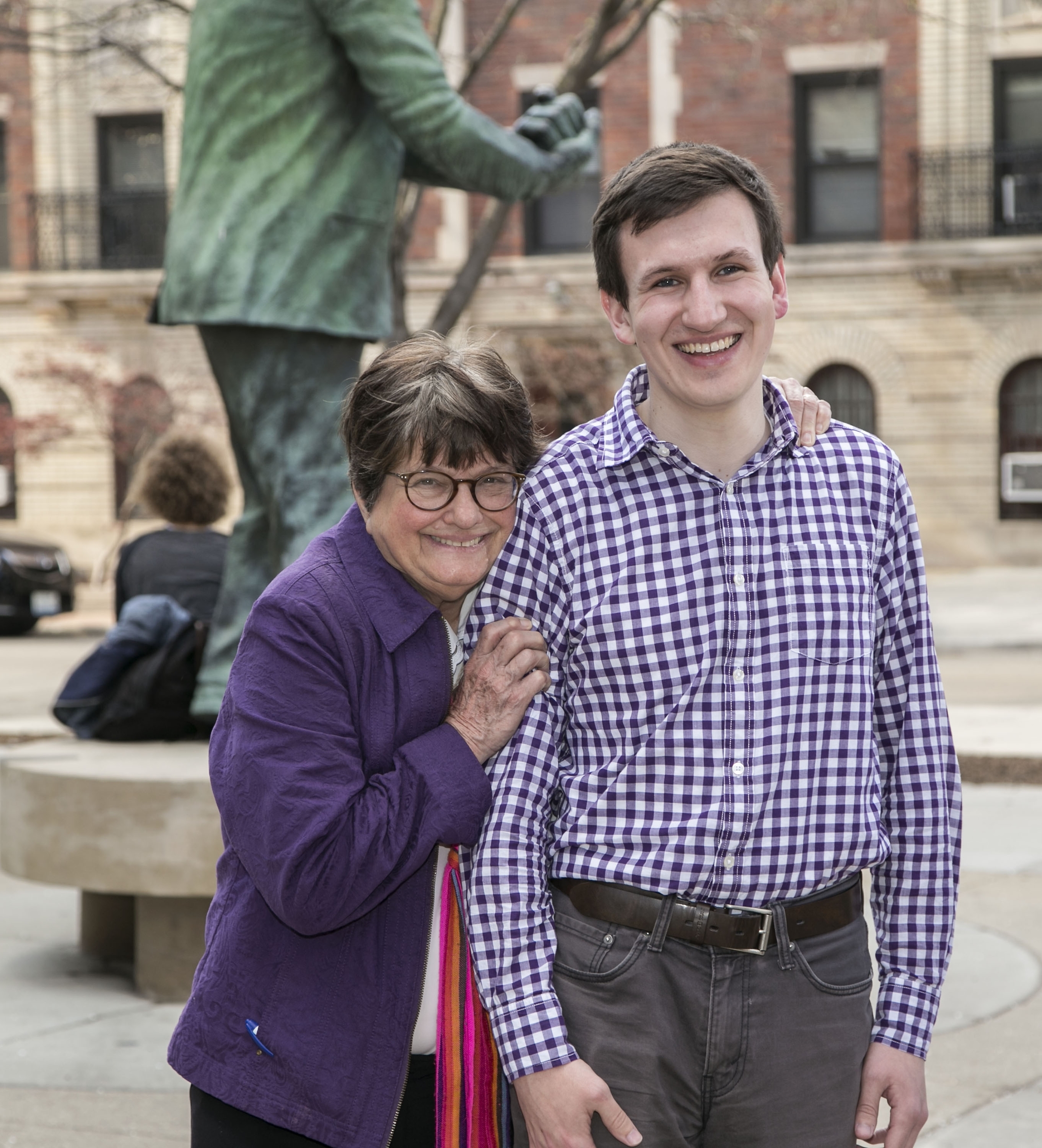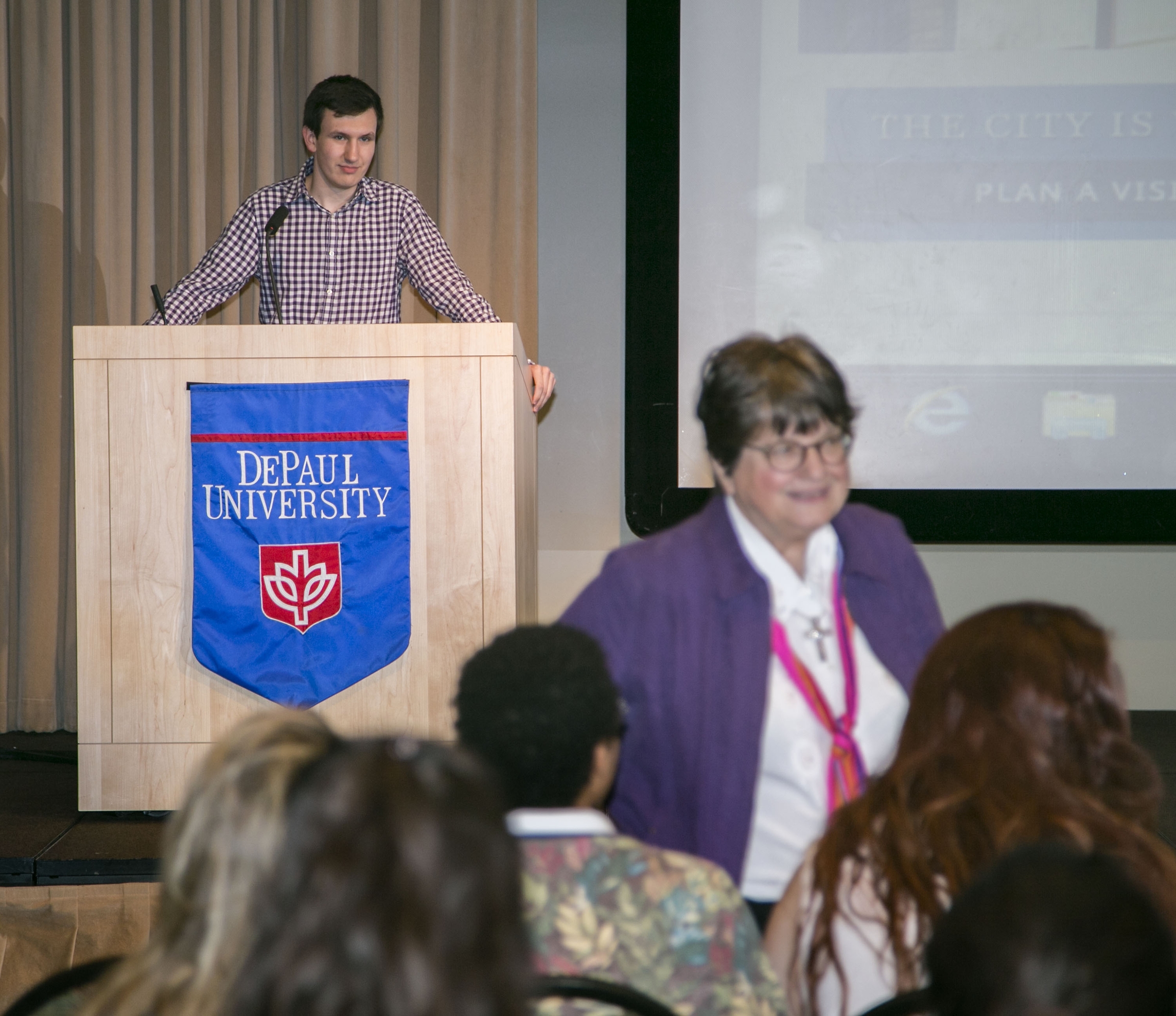One in a series of stories about graduates from the Class of 2016
Griffin Hardy (right) with anti-death penalty activist Sister Helen Prejean. Upon graduation on June 12, Hardy will continue work with Prejean’s organization Ministry Against the Death Penalty. (DePaul University/Jamie Moncrief) DOWNLOAD
CHICAGO — (ENEWSPF)–May 26, 2016. Griffin Hardy was sitting in a high school classroom in Wheaton, Illinois, when he first learned about Sister Helen Prejean’s work from the movie “Dead Man Walking.” Little did he know that his decision to attend DePaul University would allow him the opportunity to work closely with the anti-death penalty activist.
Hardy knew early on that he wanted to attend a Catholic university, but it was what he calls “Vincentian personalism” — focusing on individuals and their dignity — that drew him to attend DePaul. “It was primarily the focus of DePaul’s mission, investment in ideas and issues that matter to me as a person,” said Hardy.
Once at DePaul, deciding on a major also came relatively quickly to Hardy. During his freshman year, Hardy took a Discover Chicago class taught by a professor in the Catholic studies department. Hardy said it was the first time he had heard of a Catholic studies major.
“It was something I was interested in,” said Hardy. “I felt I could be academically engaged with it for the next four years, learning about it and gain something from it.”
This June, Hardy will graduate from DePaul’s College of Liberal Arts and Social Sciences with a Bachelor of Arts in Catholic Studies.
In pursuit of his degree, Hardy made many notable memories, including studying abroad in Rome and Paris. He also traveled to Philadelphia to see Pope Francis during his inaugural trip to the U.S. He credits two experiences as being pivotal to his experience: working with Prejean and immersing himself in a class on restorative justice.
Working with an ‘active activist’
Hardy began an internship his junior year with DePaul’s Office of Mission and Values, which works closely with Prejean. Her work against capital punishment was made famous by the 1996 Academy Award-winning film “Dead Man Walking,” based on her eponymous book. Prejean donated her personal archives to the university in 2011, which included her journals, notes from meetings, letters, speeches and other artifacts such as personal correspondence and manuscripts for her books.
Shortly after Hardy’s internship started, he began to further develop the work he was doing with Prejean’s organization Ministry Against the Death Penalty. Eventually, Hardy grew the role into the full-time job it is today: a hybrid position between the university and her organization. Hardy now coordinates Prejean’s annual visits to DePaul, manages requests to view the items she donated to the university archives, and handles online communications for her organization.
“I do a lot with Sister Helen’s Facebook and Twitter accounts, and I work with individual cases of death row prisoners, when we need to get the word out about what’s going on with them,” he said. “When you are working with an active activist, whatever she is doing, I’m doing. It just depends on the day.”
Griffin Hardy delivers remarks during an event with Sister Helen Prejean at DePaul. (DePaul University/Jamie Moncrief) DOWNLOAD
Breaking down barriers and stereotypes
A pivotal moment for Hardy happened when he went behind bars for a restorative justice class. It took place at Stateville Correctional Center and was comprised of 10 DePaul students and 10 inmates. He said the course invited students to think critically and creatively about criminal justice issues and to break down stereotypes about those inside and outside of correctional facilities.
“We would spend class talking about the justice system in the United States, some alternatives, and also how we can work on healing some of the harm that has been done instead of having a punitive system of punishment,” said Hardy. “Because the question really is: Is sending someone to prison for 20 years actually doing anything to solve the underlying problems?”
The restorative justice class was part of the Inside-Out Prison Exchange Program, a nationwide partnership between higher education institutions and correctional facilities to deepen conversations about crime, social justice, inequality and freedom.
In his work with Prejean, Hardy works closely with these topics often, “but it’s very different to be able to have those conversations with people who are on the front lines of it, who are living that out every day,” he said.
Finding the ‘path forward’
After graduation, Hardy will continue his work with DePaul’s Office of Mission and Values and Prejean’s organization, but he has loftier education goals in mind.
“I hope to go to law school, and after that, become a public defender,” said Hardy. “That’s something that I think would be an opportunity to take all of the experiences and education that I have, and channel them all into one thing that really speaks to me as a person.”
For Hardy, his personal, professional and educational experiences have shown him a precise “path forward.” He added, “That path has aligned with everything that I’ve learned about myself, and learned academically here.”
“It’s sort of just one of those things when you see it, you see it. And it makes a lot of sense.”
[widget id=”bizy_search_widget-2″]










